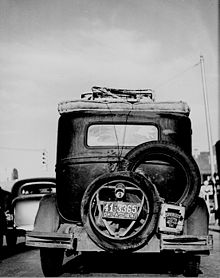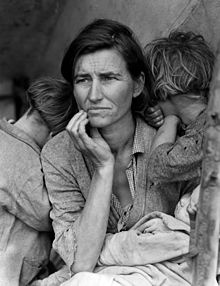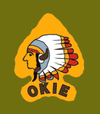- Okie
-
For the J. J. Cale album, see Okie (album).
 Rear view of an Okie's car, passing through Amarillo, Texas, heading west, 1941
Rear view of an Okie's car, passing through Amarillo, Texas, heading west, 1941
Okie is a term dating from as early as 1907,[1] originally denoting a resident or native of Oklahoma. It is derived from the name of the state, similar to Texan or Tex for someone from Texas, or Arkie or Arkansawyer for a native of Arkansas.
In the 1930s on the West Coast, especially California, the term (often used in contempt) came to refer to a migrant who left the South, Midwest, and sometimes, Southeast United States to settle in large numbers to restart their lives in the region's thriving agriculture and manufacturing industries. Most worked on farms, and in the shipyards and defense factories leading up to and following World War II. The Dust Bowl as well as a federal program which took farm land out of production [2] caused many to lose or leave their homes.
Rural white and American Indian farmers of Oklahoma, and from the Southern and Central states had been relocating to the Northeast and west coast since the 1850s, but the "Okie" migration of the 1930s brought in over a million new displaced residents to California's Central valley and major cities bucked the trend.
Dunbar-Ortiz (1996) argues that 'Okie' denotes much more than being from Oklahoma. By 1950, four million individuals, or one quarter of all persons born in Oklahoma, Texas, Arkansas, or Missouri, lived outside the region, primarily in the West. The core group of Okies are descendants of Scotch Irish who display a marked individualistic political bent. During 1906-17 many became Socialists or joined the Industrial Workers of the World, and Okies tended toward left-populism in the 1930s. Prominent Okies in the 1930s included Woody Guthrie. Most prominent in the late 1960s and 1970s were country musician Merle Haggard and writer Gerald Haslam.[3]
Contents
Great Depression usage
In the 1930s to the mid-thirties, during the Dust Bowl era, large numbers of farmers fleeing ecological disaster and the Great Depression migrated from the Great Plains and Southwest regions to California mostly along historic U.S. Route 66. More of the migrants were from Oklahoma than any other state, and a total of approximately 15% of the Oklahoma population left for California.
Ben Reddick, a free-lance journalist and later publisher of the Paso Robles Daily Press, is credited with first using the term Oakie, in the mid-1930s, to identify migrant farm workers. He noticed the "OK" abbreviation (for Oklahoma) on many of the migrants' license plates and referred to them in his article as "Oakies." Californians began calling all migrants by that name, even though many newcomers were not actually Oklahomans.
Many West Coast residents and some politically motivated writers used "Okie" to disparage these poor, white (including those of mixed American Indian ancestry, the largest tribal group being Cherokees), migrant workers and their families. The term became well-known nationwide by John Steinbeck's novel The Grapes of Wrath.
Will Rogers, a famous movie star with Oklahoma roots remarked jokingly that the Okies moving from Oklahoma to California increased the average intelligence of both states.
Modern usage
It has been said that some Oklahomans who stayed and lived through the Dust Bowl see the Okie migrants as being quitters who fled Oklahoma; but there is hardly a native Oklahoman who does not have some family member who made the trip down Route 66. Most Oklahoma natives are as proud of their Okies who made good in California as are the Okies themselves—and of the Arkies, West Texans, and others who were cast in with them.[4]
In the later half of the 20th century, there became increasing evidence that any pejorative meaning of the term Okie was changing; former and present Okies began to apply the label as a badge of honor and symbol of the Okie survivor attitude.[5]
In one example, Republican Oklahoma Governor Dewey F. Bartlett launched a campaign in the 1960s to popularize Okie as a positive term for Oklahomans;[6] however, the Democrats used the campaign, and the fact that Bartlett was born in Ohio, as a political tool against him,[7] and further degraded the term for a time.
However, in 1968, Governor Bartlett made Reddick, the originator of the California usage, an honorary Okie. And in the early 1970s, Merle Haggard's country song Okie from Muskogee was a hit on national airwaves.
Also during the 1970s, the term Okie became familiar to most Californians as a prototype of a subcultural group, just like the resurgence of Southern American regionalism and renewal of ethnic American (Irish American, Italian American or Polish American) identities in the Northeast and Midwest states at the time.
However, in the early 1990s the California Department of Transportation refused to allow the name of the "Okie Girl" restaurant to appear on a roadside sign on Interstate 5, arguing that the restaurant's name insulted Oklahomans; only after protracted controversy (and a letter from the Governor of Oklahoma) did the agency relent.[8]
Since the 1990s, the children and grandchildren of Okies in California changed the very meaning of Okie to a self-title of pride in obtaining success, as well to challenge what they felt was snobbery or "the last group to make fun of" in the state's urban area cultures.
While some Oklahomans refer to themselves as Okies without prejudice, and it is often used jocularly; in a manner similar to the use of Hoosier by Indianans, Yankee by Northeasterners, or "Cracker" by native Floridians, none of whom considers these terms for themselves particularly insulting, many others still find the term highly offensive.
Muskogee Mayor John Tyler Hammons used the phrase "I'm proud to be an Okie from Muskogee" as the successful theme of his 2008 mayoral campaign.
Popular culture
Novels
John Steinbeck's 1939 novel The Grapes of Wrath won the Pulitzer Prize for its controversial characterization[9][10] of the Okie lifestyle and journey to California.
In the Cities in Flight series of science fiction novels (1956–1962) by James Blish, the term "Okie" was applied in a similar context to entire cities that, thanks to an anti-gravity device, took flight to the stars in order to escape the Earth's economic collapse. Working as a migrant labor force, these cities came to act as cultural pollinators, spreading technology and knowledge throughout the expanding human civilization. The later novels focus on the travels of New York City as one such Okie city, though there are hundreds less.
In On the Road, the road novel by Jack Kerouac - written between 1948 and 1949, although not published until 1957 - the term appears to refer to some of the people the main character, a worker on a cotton plantation in California, meets during his trips around the states.
In the novel Paint it Black by Janet Fitch, the protagonist (an LA punk-rocker in the early '80s) thinks of herself and her family as "Okies."
Music
- California Okie - Buck Owens (1976).
- Dear Okie - Doye O’Dell/Rudy Sooter (1948)—"Dear Okie, if you see Arkie, tell ’im Tex’s got a job for him out in Californy."
- Lonesome Okie Goin’ Home - Merl Lindsay and the Oklahoma Night Riders (1947).
- Oakie Boogie - Jack Guthrie and His Oklahomans (1947)—considered by many to be the first Rock & Roll song.
- Okie - J. J. Cale (1974).
- Okie From Muskogee - Merle Haggard (1969)—58th on the Top 500 Country Music Songs list.
- Okie Skies - The Bays Brothers (2004).
- Okies in California - Doye O'Odell (1949).
- Ramblin' Okie - Terry Fell.
- She's An Okie - Al Vaughn.
- Okanagan Okie - Stompin' Tom Connors [11]
- April The 14th Part I & Ruination day Part II "And the Okies fled. And the great emancipater" (Time-The Revelator - Gillian Welch. Welch/Rawlings (2001).
Poetry
- Cahill, Charlie. Point Blank Poetry: Okie Country Cowboy Poems. Midwest City, OK: CF Cahill, 1991. LoC Control Number: 92179243
- Harrison, Pamela. Okie Chronicles. Cincinnati: David Robert Books, 2005. ISBN 1-932339-87-6
- McDaniel, Wilma Elizabeth. California Okie Poet Laureate. All works.
- Rose, Dorothy. Dustbowl Okie Exodus. Seven Buffaloes Press, 1987. ISBN 9998546451
Other fiction
- Charles, Henry P. That dumbest Okie, and other short stories: Oklahoma! "The land of honest men and slender women." Wetzel, c1952.
- Cuelho, Artie, Jr. At the Rainbow's End: A Dustbowl Collection of Prose and Poetry of the Okie Migration to the San Joaquin Valley. Big Timber, Montana: Seven Buffaloes Press, 1982. ISBN 0-916380-25-4
- Haslam, Gerald. Okies: Selected Stories. Santa Barbara, California: Peregrine Smith, Inc, 1975. ISBN 0-87905-042-X
- Hudson, Lois Phillips. Reapers of the Dust. Minnesota Historical Society Press, 1984. ISBN 0873511778
Other uses
- Call OKIE is a non-profit organization created to oversee underground utilities and excavations in the state of Oklahoma. It was created in response to the Oklahoma Underground Facilities Damage Prevention Act enacted in 1981.[12]
- Okie was the name of two P-47 fighter/bombers piloted by Maj. Quince L. Brown of the 84th Fighter Squadron, 78th Fighter Group, during World War II. Brown was one of the 8th Army Air Force's first aces and credited with 14.333 victories. His first P-47D was noted for its distinctive artwork. He was killed during his second combat tour. Brown's hometown was Bristow, Oklahoma, and he was inducted into the Oklahoma Aviation and Space Hall of Fame in 1994.[13][14]
- OKIE (Oklahoma Israel Exchange) is an independent non-profit organization established to coordinate economic and cultural activities between the state of Oklahoma and the state of Israel. It was created 1992 by Oklahoma Governor David Walters.[15]
- The Okie Derby is the world's largest proficiency air rally. It is sponsored annually by the Oklahoma Chapter of the Ninety-Nines (International Organization of Women Pilots).[16]
- An OKIE pin, a promotional souvenir developed by Governor Dewey Bartlett, (and an Oklahoma flag), was placed in the Apollo 10 lunar module Snoopy by Commander Thomas P. Stafford before it was sent into orbit around the sun.[17]
- The USS Oklahoma, christened March 23, 1914, was affectionately called "Okie" (or "Okey") by its crew.[18]
See also
- Oklahoma
- Dust Bowl
- Grapes of Wrath
- Migrant worker
- Pejorative
- Prejudice
- Redneck
- Will Rogers
- Okie Dialect
- Black Sunday
Notes
- ^ Stewart, Roy P. "Postal Card Proves Sooners Were 'Okies' Way Back In 1907," The Daily Oklahoman, Friday, December 20, 1968, pg. 9, col. 2. "Now comes Mrs. Agnes Hooks of Thomas with a postal card mailed at Newcastle, Ind. in 1907, address to a Miss Agness Kirkbridge, with the salutation: "Hello Okie — Will see you next Monday night." Signed: Myrtle M. Pence. Mrs. Hooks says Agness Kirkbridge was an aunt of hers. The Kirkbridge family came to Oklahoma Territory in 1904 and settled south of Custer City.
- ^ Okie Migrations
- ^ Roxanne Dunbar-Ortiz, "One or Two Things I Know about Us: Rethinking the Image and Role of the 'Okies'," Canadian Papers in Rural History 1996 10: 15-43
- ^ Haslam, The Other California, p. 107: "Says Jim Young, chancellor of Bakersfield College, 'I'm proud of my folks and everyone else who came out here and were called Okies, and who made new lives for themselves.' Young, of course, symbolizes well why others in the Central Valley are so proud to claim that term Okie.
- ^ "State to Print 'Okie Dough'," The Daily Oklahoman, Thursday, 27 Oct 1955, pg. 20, col. 3: "A new type of money, designed to boost Oklahomans' pride in the Sooner state, soon will be off the press as part of the Greater Oklahoma City Forward committee's program. Known as "Okie Dough," the script will also be useful in braging [sic] in the other 47 states."
- ^ Editorial, "Speaking of Okies," The Daily Oklahoman, June 6, 1970, pg. 8, col. 1: "Bartlett did not invent the term. He simple recognized its existence in the vocabulary—and gambled that nothing was more likely to erase its stigma than letting outsiders know Sooners themselves rather liked being called Okies."
- ^ "Democrat Gets In Plug for Donkey," The Daily Oklahoman, Friday, June 2, 1970, pg. 3. col. 1: "In a release last week, Kennedy [State Democratic Chairman J.C. Kennedy] charged, the pins were campaign buttons for Gov. Bartlett. He demanded Monday that state employees be instructed to view all Okie type paraphernalia as political material and that it be treated in accordance with state rules and regulations governing such matters."
- ^ David Colker, "Los Angeles County News in Brief: Quake Delivers Knockout Punch to Okie Girl Eatery," Los Angeles Times, February 2, 1994, Part B, Page 2.
- ^ Windschuttle, "Steinbeck's Myth of the Okies": "Unfortunately for the reputation of the author John Steinbeck, however, there is now an accumulation of sufficient historical, demographic, and climatic data about the 1930s to show that almost everything about the elaborate picture created in the novel The Grapes of Wrath is either outright false or exaggerated beyond belief."
- ^ Igler, The Human Tradition in California, p. 144: "Charles Schindo, in Dust Bowl Migrants in the American Imagination (1997), contended that Steinbeck and his fellow 1930s liberals were elitists who misinterpreted the Okie experience and then imposed that leftist misinterpretation on the American consciousness."
- ^ •—•Okanagan Okie•—•
- ^ [1]
- ^ [2]
- ^ [3]
- ^ [4]
- ^ [5]
- ^ Young, Jim, "Apollo Carries Sooner Cargo", The Daily Oklahoman, Monday May 19, 1969, pg. 1 col. 1: "Plans call for one flag and one Okie pin to be placed in orbit around the sun when astonauts abandon their lunar module prior to their return to earth."
- ^ [6] [7]
References
- Haslam, Gerald W. The Other California: The Great Central Valley in Life and Letters. University of Nevada Press, 1993. ISBN 087417225X
- Igler, David; Clark Davis. The Human Tradition in California. Rowman & Littlefield, 2002. ISBN 0842050272
- Windschuttle, Keith. "Steinbeck's Myth of the Okies". The New Criterion, Vol. 20, No. 10, June 2002.
Further reading
- Gregory, James N. American Exodus: The Dust Bowl Migration and Okie Culture in California. New York: Oxford University Press, 1998. ISBN 0-19-504423-1
- La Chapelle, Peter. Proud to Be an Okie: Cultural Politics, Country Music, and Migration to Southern California. Berkeley: University of California Press, 2007. ISBN 0-520-24889-2
- Lange, Dorothea; Paul S. Taylor. An American Exodus: A Record of Human Erosion. 1939.
- Morgan, Dan. Rising in the West: The True Story of an "Okie" Family from the Great Depression through the Regan Years. New York: Knopf, 1992. ISBN 0-394-57453-2
- Ortiz, Roxanne Dunbar. Red Dirt: Growing up Okie. New York: Verso, 1997. ISBN 1-85984-856-7
- Ortiz, Roxanne Dunbar. "One or Two Things I Know about Us: Rethinking the Image and Role of the 'Okies'," Canadian Papers in Rural History 1996 10: 15-43
- Shindo, Charles J. Dust Bowl Migrants in the American Imagination. Lawrence: University Press of Kansas, 1997. ISBN 978-0-7006-0810-2
- Sonneman, Toby F. Fruit Fields in My Blood: Okie Migrants in the West. Moscow, Idaho: University of Idaho Press, 1992. ISBN 0-89301-152-5
- Weisiger, Marsha L. Land of Plenty: Oklahomans in the Cotton Fields of Arizona, 1933-1942. Norman: University of Oklahoma Press, 1995. ISBN 0-8061-2696-5
External links
Categories:- California culture
- Demographic history of the United States
- Oklahoma culture
- Pejorative terms for people
- American regional nicknames
- Dust Bowl
Wikimedia Foundation. 2010.



